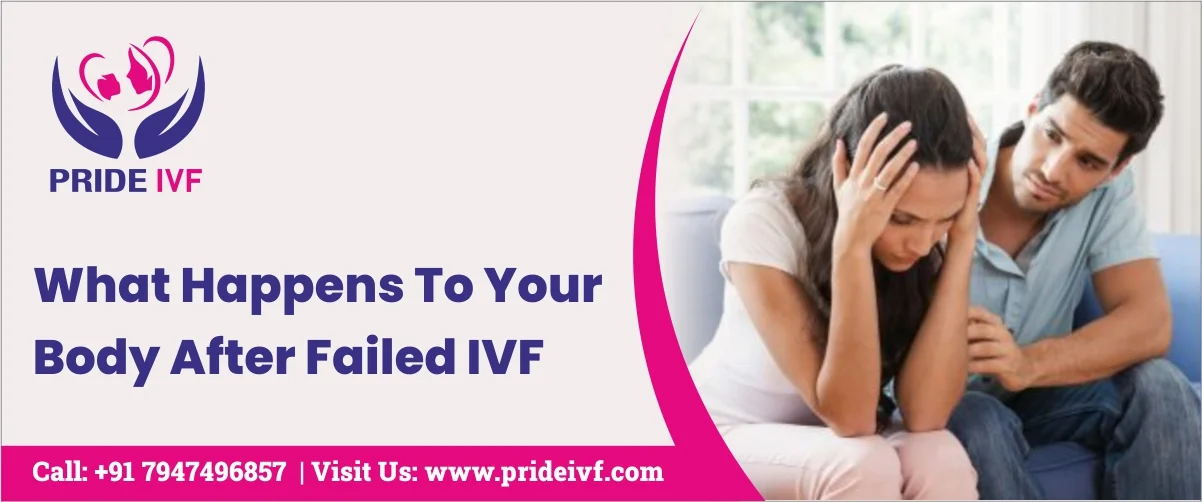When individuals or couples can not get pregnant naturally, In vitro Fertilization (IVF) serves as a ray of hope. IVF has a higher success rate compared to other Artificial Reproductive Technology (ART) procedures. However, there is still a chance that the procedure will fail. A failed procedure can have various physical and emotional implications which is why people often ask “what happens to your body after failed ivf”, but they can be managed conveniently by taking the necessary steps. Read on as we discuss what IVF is, the factors that can cause a failed IVF procedure, and how to recover from it. Consult Pride IVF Centre in Delhi today.




What is IVF?
IVF Kya hai: In Vitro Fertilization, or IVF, is an Artificial Reproductive Technology (ART) procedure used to help individuals or couples have a child. In this procedure, a woman’s fully fertilized eggs are extracted from the ovaries and fertilized using sperm from the male partner or donor in a lab. Then, the formed embryos are placed into the uterus. Generally, one cycle of IVF takes about 2 to 3 weeks to complete.
IVF is considered a viable option for men and women with fertility issues. While this procedure is quite successful, its outcomes depend on several factors, including, but not limited to, the woman’s age, quality of eggs, sperm, embryo, and lifestyle factors. It’s important to get all the assessments done before the procedure and to discuss with the doctor ways to ensure successful outcomes of this procedure.
What Can Cause a Failed IVF Procedure?
It’s possible for an IVF procedure to fail. The reasons for a failed IVF procedure are manifold and may vary from person to person. Having a comprehensive understanding of factors that can cause the IVF procedure to fail is essential to minimise risks and improve the chances of successful conception in the future.
Listed below are the main reasons for a failed IVF procedure:
- Compromised Egg Quality: Egg quality can be affected by various factors, including underlying health conditions, age, and lifestyle factors. Compromised egg quality can also impact the success of the IVF process.
- Poor Sperm Quality: In addition to egg quality, the quality of sperm, including sperm count, motility, and morphology, can also impact IVF success.
- Embryo Development: Several people wonder “Why does ivf fail with good embryos?’ Some factors, including chromosomal abnormalities or improper embryo culture conditions can lead to a failure of embryo implantation.
- Uterine Conditions: If a woman has uterine conditions, such as fibroids, scar tissues, etc, they can affect the embryo implantation process. This can, thereby, impact IVF outcomes.
- Hormonal Imbalance: Hormonal imbalances, including fluctuating hormone levels or a failed response to fertility medication, can all hinder the IVF process.
- Genetic Factors: Different genetic abnormalities can increase the risk of embryo implantation failure. This may also increase the risk of miscarriage after the IVF process. Also Read: Pregnancy After Miscarriage.
There are multiple questions to ask ivf doctor after a failed cycle which one should look out for. Pride IVF provides customized treatments in order to reduce the chances of failure.
Also Read: Things I Wish I Knew Before IVF, When to Expect Period After Failed IVF?
What Happens to Your Body After Failed IVF?
A failed IVF cycle can have various implications. It can have multiple physical implications. Hormone imbalance after failed IVF is also common and shows various physical symptoms. It’s normal for women who’ve had a failed IVF to experience physical symptoms such as bloating, cramping, and significant fatigue.
To understand the physical implications of IVF on the body, it’s essential to understand that the procedure involves stimulating the ovaries through fertility medication. This causes the development of multiple follicles. These medications may accompany some side effects which you may experience. If a woman experienced ovarian hyperstimulation syndrome OHSS) during the IVF procedure, which involves enlarged ovaries and fluid retention, their symptoms may be much more severe. Symptoms in these cases include abdominal pain, difficulty breathing, nausea, and vomiting.
In addition, the physical recovery may vary from person to person after a failed IVF. While some women may experience significant symptoms, others might experience less intense symptoms.
To deal with the physical aspects of failed IVF, it’s essential to take your fertility specialist’s advice. They can help you with the best practices to deal with the impacts of a failed IVF and recover seamlessly.
Lets get started
How To Recover From Failed IVF?
While a failed IVF is unfortunate and may impact a woman both physically and emotionally, it’s essential to focus on recovery. You should also know that ensuring a healthy physical recovery after a failed cycle of IVF can increase your chances of the next cycle of IVF. Yes, even if your IVF cycle fails, but you’re healthy, you can always go for another cycle with the doctor’s advice.
Here are some tips to physically recover after a failed IVF procedure:
- Take Complete Rest: It’s essential to take complete rest after a failed IVF procedure. It’s important to give the body the time to heal and recover. You must prioritize rest, take some days off work, and relax.
- Avoid Physical Stress: Do not rush into physical activity, such as heavy workouts, lifting heavy objects, or taxing household chores until fully recovered. Gentle exercise and yoga can be beneficial during this period.
- Keep a Check on Your Symptoms: Several symptoms can occur after a failed IVF, so paying attention to them is important. Recognizing symptoms in time can help avoid potential complications.
- Take Pain-Relieving Measures: It’s normal to experience some pain and discomfort after an IVF procedure. The doctor may recommend some medication to manage this pain and some home remedies. These may include using ice packs or warm compresses.
- Eat the Right Foods: You must eat a diet that’s rich in fruits, vegetables, whole grains, and lean proteins to ensure healthy recovery. In addition, you must maintain complete hydration. Drinking 7 to 8 glasses of water is recommended.
- Get Support: It’s normal for women to experience depression after failing IVF, in addition to other emotional implications. There are multiple stages of grief after failed ivf. It’s important to seek support from friends and family to make it through this difficult time and heal both physically and emotionally.
Chances of Success of Another IVF Cycle
After a failed IVF cycle, several patients wonder whether they’d be able to conceive with IVF on their next try. It’s an essential consideration as IVF is a costly procedure, requiring couples to be sure before investing in another cycle. You should note that the success of another IVF cycle after a failed one is subject to differ. While you may feel distressed after a failed IVF cycle, you must stay optimistic as the ivf success rates in india differs from cycle to cycle. In addition, factors like maintaining proper health and making efforts to optimise outcomes can also improve the chances of conception in the following cycle. These include getting all the necessary diagnostic tests done, fulfilling the body’s nutritional requirements, maintaining a healthy weight, and following the doctor’s advice at every step.
In addition, several couples also like to know their chances of a natural pregnancy after failing IVF. The answer is YES. It’s possible to conceive naturally after a failed IVF cycle, given a couple of individuals have no underlying conditions that may hamper successful pregnancy. In fact, several couples who’ve had failed IVF procedures get pregnant naturally. What’s important is to stay optimistic and ensure proper reproductive health.
To Sum Up
IVF gives couples unable to get pregnant through natural means a chance to live their dream of parenthood. However, if a cycle of IVF fails (Why IVF Fails?), they become more disheartened. You should know that by dealing with both the physical and emotional impacts of failed IVF, you can increase your chances of conception and avoid complications in your next cycle.




